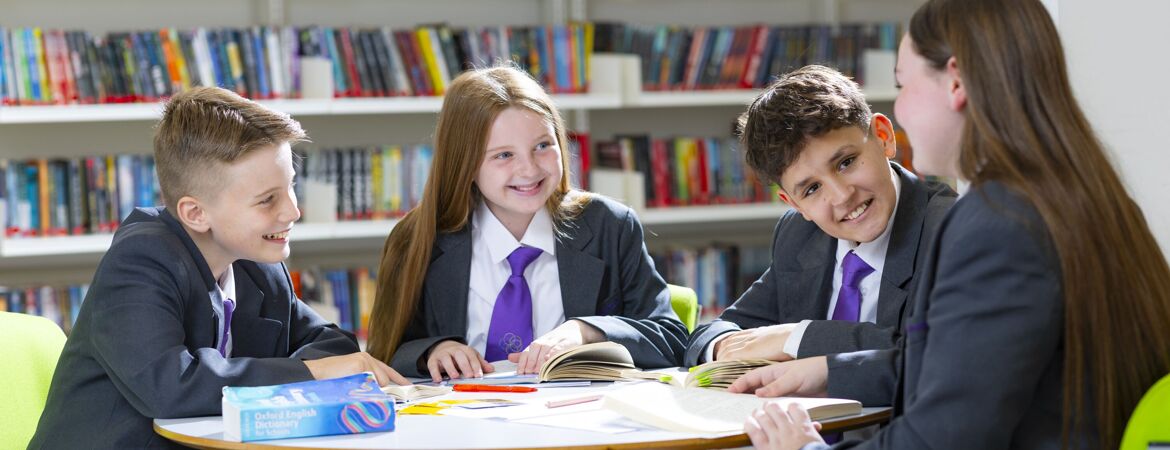Reading
At St Augustine Academy, we understand that literacy sits at the heart of the curriculum because all subjects are taught in English: pupils need the foundational knowledge of reading, writing, speaking and listening in order to access the breadth and depth of the curriculum.
All teachers have a key responsibility to teach literacy, no matter their subject specialism. We recognise that regular reading helps pupils to develop greater fluency, vocabulary and background knowledge, which supports their development across the curriculum.
What will you see at St Augustine Academy?
- A well-stocked library with active librarians promoting reading, running enrichment activities, creating relevant thematic displays, running competitions and promoting reading
- A range of writing competitions promoted by the English department throughout the academic year
- What is my teacher reading? Posters that celebrate the reading habits of staff across the academy
- DEAR (Drop Everything and Read) in every mentor group years 7-10 for twenty minutes every week – all pupils are expected to have a book in their bag (year 10 to be supplied with a booklet)
- A weekly WOW (word of the week) linked to our themes and assemblies
- A team of tutors providing bespoke reading interventions for students to support them towards their chronological age
- The use of Rosetta Stone to support the development of reading for students with English as a second language
- Every department has a specific disciplinary literacy policy and action plan detailing how they will teach reading, writing, speaking and listening within their subject areas i.e explicit vocabulary instruction using choral repetition
- Twice yearly reading age testing, with reading ages reported to parents and given to staff to consider within their own planning and preparation of lessons
- In English, termly reading lessons in the library, bespoke booklets to support reading and learning, further recommended reading lists for every year group
- Use of Bedrock Learning in years 7-9 to support reading from home
- Year 7 have access to a free new book through Book Buzz programme
- CPD for all staff on literacy and reading – available both in-house and through the National College
Improving my child's reading ability
How can I promote reading and improve my child’s reading ability?
Make reading important:
When your children see you reading they are much more likely to read themselves!
- Give books as presents
- Keep reading together – whatever the age!
- Find books for topics that your children are interested in – all reading is good!
- Read favourites again and again – this will build fluency and confidence
- Read whenever you get the chance – Bring along a book or magazine for any time your child has to wait, such as at a doctor’s surgery
- Ask questions – To keep them interested in the story, ask your child questions as you read such as, ‘What do you think will happen next?’ or ‘Where did we get to last night? Can you remember what has happened already?’
What if my children just don’t enjoy reading?
- Make sure your child isn’t tired, hungry or desperate to watch their favourite TV programme when you read to them
- Sit with them for a short time every day and read a book with them on a subject that interests them, whether that’s cars, animals or sports. Don’t expect them to read it for themselves. Just show them how interesting it is to be able to read so that they want to do it for themselves
- For many children, especially boys as they get older, non-fiction books are more interesting than fiction, so it may be as simple as changing the type of books you are reading together
- Talk to your teacher or a local children’s librarian to see what books are available that match your child’s interests
- Give plenty of praise. Let your child know how pleased you are when he or she looks at a book. Show interest in what they have chosen. Children really do develop at their own rates when it comes to reading
My child is switching off reading - what can I do?
- It’s important to make sure that you’re reading something with your child which interests them. Many boys like non-fiction books, so try asking at your local library for recommendations – it may be that he’ll enjoy reading Horrible Histories or the Guinness Book of Records more than fiction
- Role models are also important. Make sure children see their dads, mothers, aunties, uncles or grandparents reading, even if it’s a newspaper, so that it seems familiar and they can copy their reading behaviour
Finally, praise your child when something is read well. Equally, if they read something incorrectly, don’t make them feel that this is bad - mistakes are just part of the learning



